- Last Updated: January 15th, 2026
Key Takeaways
Polychlorinated biphenyls (PCBs) have stirred notable litigation challenges against corporations known for their involvement in the chemical's production and distribution.
The Monsanto Company, formerly a major manufacturer of PCBs, is facing numerous lawsuits in federal and state courts alleging that the company intentionally misled the public about the toxicity of PCBs.
The legal landscape has transformed due to increasing knowledge about the detrimental impact of PCBs and the involvement of Monsanto.
PCB Litigation: Legal & Ethical Challenges
On this page, we’ll discuss an overview of PCB litigation, legal and ethical challenges surrounding PCB lawsuits, strategies for pursuing compensation for PCB exposure, and much more.
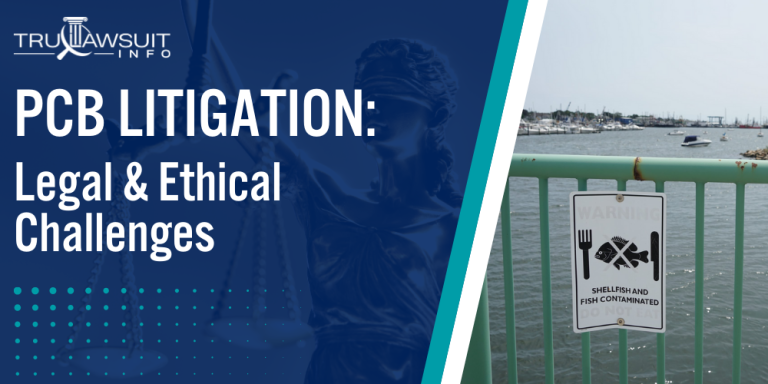
Intro to PCB Litigation
The rise in PCB litigation stems from the growing awareness of the harmful effects of PCB exposure and the need to hold responsible parties accountable.
Here are the key aspects of PCB litigation:
- Establishing Liability: Identifying the parties responsible for the PCB contamination and proving their negligence or wrongdoing.
- Demonstrating Causation: Linking the plaintiff’s health issues or property damage to the specific PCB exposure.
- Calculating Damages: Assessing the extent of the harm caused by PCB exposure and determining appropriate compensation.
- Statutes of Limitations: Ensuring that claims are filed within the legal time limits set by each jurisdiction.
If you or a loved one has experienced adverse health conditions after being exposed to PCB chemicals, you may qualify to pursue compensation.
Contact TruLawsuit Info using the chat on this page to receive an instant case evaluation to determine if you qualify to file a PCB lawsuit today.
Common Legal and Ethical Challenges of the PCB Litigation
The litigation surrounding polychlorinated biphenyls (PCBs) presents distinct legal and ethical challenges, including property ownership disputes and the pursuit of efficient environmental remediation.
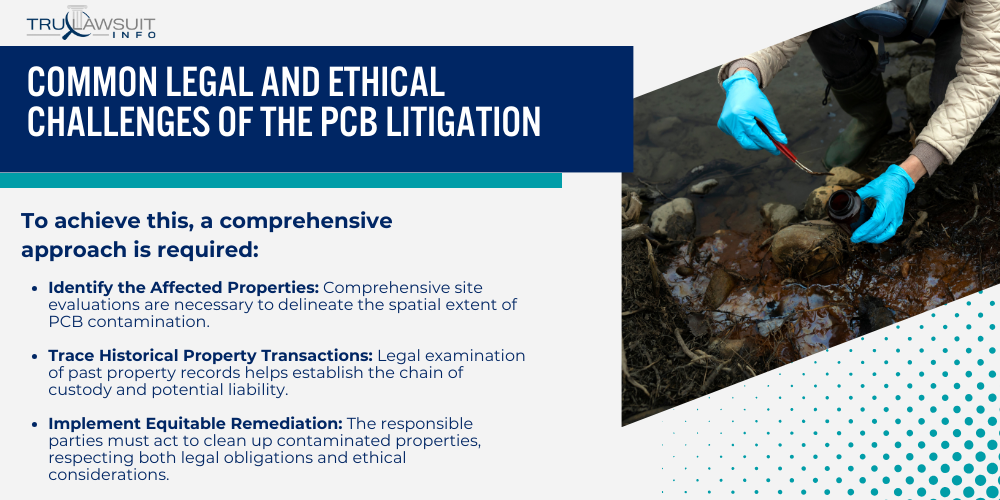
These hurdles are complicated by PCBs’ hazardous nature and widespread environmental impact.
Resolving Property Ownership Issues: Integrity in PCB Disputes
Determining the rightful ownership of property contaminated with PCBs is a significant legal challenge.
This process involves detailed assessments and clear ethical standards to ensure just outcomes.
To achieve this, a comprehensive approach is required:
- Identify the Affected Properties: Comprehensive site evaluations are necessary to delineate the spatial extent of PCB contamination.
- Trace Historical Property Transactions: Legal examination of past property records helps establish the chain of custody and potential liability.
- Implement Equitable Remediation: The responsible parties must act to clean up contaminated properties, respecting both legal obligations and ethical considerations.
- Safeguard Natural Resources: Remediation efforts should prioritize preserving and restoring natural resources affected by toxic PCBs.
Enhancing PCB Cleanup Efficiency with Ethical Legal Approaches
Boosting the efficiency and effectiveness of PCB cleanup operations requires an approach that harmonizes legal frameworks with environmental ethics.
To achieve this, we can implement a multi-pronged strategy that addresses both legal and ethical considerations:
- Streamline Legal Processes: Simplifying litigation procedures can expedite the resolution of PCB disputes, with courts like the Superior Court often playing a decisive role.
- Focus on Responsible Parties: Ensuring that entities such as manufacturers are held accountable for their role in PCB distribution is essential.
- Prioritize High-Risk Areas: Special attention should be given to regions severely impacted by PCB contamination, such as Lake Michigan and its surrounding ecosystems.
- Collaborate with Educational Centers: Engaging organizations like Sky Valley Education Center can foster public awareness and involvement to address pcb contamination.
Both the legal and ethical dimensions of PCB litigation significantly influence the success of environmental protection efforts aimed at mitigating the harms of these toxic substances.
Ethical Site Characterization in PCB Litigation
Ethical site characterization forms the foundation of credible litigation and cleanup efforts related to PCB contamination.
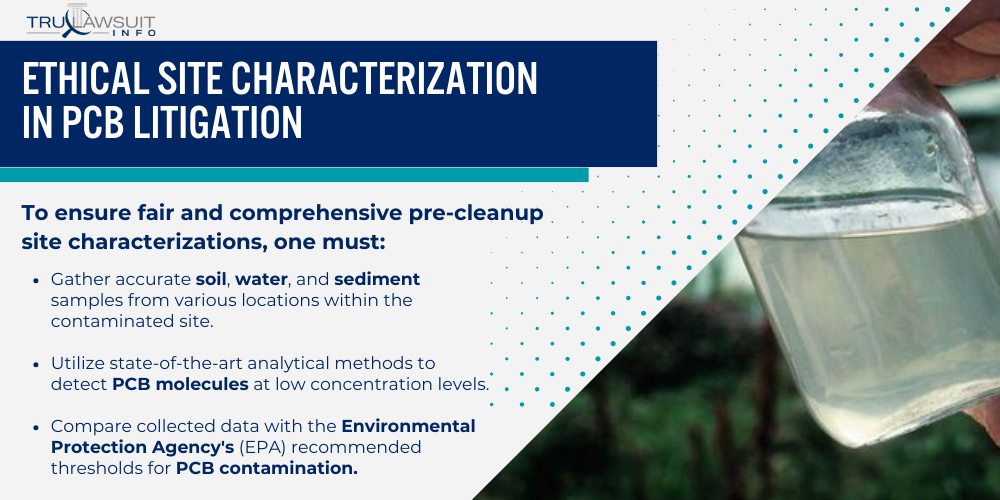
It necessitates rigorous standards and transparent practices to protect human health and the environment effectively.
Implementing Fair Pre-Cleanup Site Characterizations
Site characterization is an integral first step in addressing PCB pollution.
It involves assessing the presence and concentration of highly toxic chemicals and determining the extent of environmental and health risks.
To ensure fair and comprehensive pre-cleanup site characterizations, one must:
- Gather accurate soil, water, and sediment samples from various locations within the contaminated site.
- Utilize state-of-the-art analytical methods to detect PCB molecules at low concentration levels.
- Compare collected data with the Environmental Protection Agency’s (EPA) recommended thresholds for PCB contamination.
- Engage independent auditors for verification of data and methods to eliminate potential biases.
Ensuring Ethical Development of PCB Litigation Cleanup Plans
Developing cleanup plans for PCB litigation requires a balance between thorough remediation and cost-effectiveness.
The ethical development of cleanup plans should include:
- Clear objectives that prioritize public health and ecosystem restoration.
- Establishing cleanup standards in line with EPA guidelines for PCB remediation waste.
- Incorporating stakeholder input, including the affected community’s concerns and suggestions.
- Documentation of all decision-making processes and criteria used for remedy selection.
Upholding Transparency in PCB Cleanup Certifications
Transparency plays a pivotal role in maintaining public trust during the cleanup certification process for PCB sites.
To uphold transparency in cleanup certifications, one must:
- Disclose the full cleanup site map and data on PCB concentrations to the public.
- Ensure that all laboratory analytical reports are accessible, including quality assurance and control samples.
- Notify relevant authorities and stakeholders at each significant phase of the cleanup process.
- Regularly update the affected communities on the progress and any changes to the cleanup plans.
Strategic and Ethical Approaches in PCB Cleanup Litigation
When navigating PCB cleanup litigation, legal teams focus on strategies aligned with environmental regulations and ethical concerns to address contamination and protect public health.
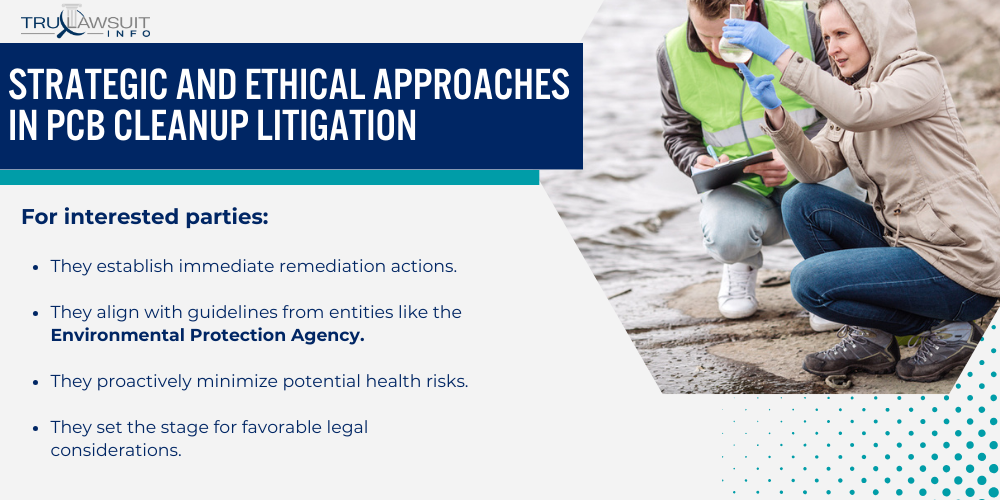
Advocating for Self-Implemented Cleanup
Self-implemented cleanup strategies are pivotal for swiftly addressing PCB contamination, often prior to or regardless of litigation outcomes.
For interested parties:
- They establish immediate remediation actions.
- They align with guidelines from entities like the Environmental Protection Agency.
- They proactively minimize potential health risks.
- They set the stage for favorable legal considerations.
In Illinois, for instance, the Illinois Environmental Protection Agency provides oversight, ensuring that self-implemented cleanups adhere to state standards.
Adopting Performance-Based Strategies with Ethical Considerations
Strategic litigation often entails performance-based approaches that quantify remediation success, focusing on tangible results.
Ethically grounded actions should:
- Uphold the highest environmental standards for safety and health.
- Reflect a transparent reporting method on cleanup progress.
- Maintain compliance with state programs, like the State’s PCB testing program.
- Mitigate environmental impacts through continuous improvement.
Authorities such as the Delaware Supreme Court have influenced performance-based litigation standing, emphasizing the importance of ethical commitment within legal frameworks.
Pursuing Risk-Based Cleanup Approvals with Legal Integrity
Risk-based cleanup involves strategies prioritizing areas with higher exposure risks.
Legal teams pursuing this approach should:
- Handle environmental data with maximum integrity.
- Present comprehensive assessments concerning human and ecological risks.
- Seek approvals within a framework supported by legal and scientific evidence.
- Engage with governmental agencies, like the Environmental Protection Agency, for guidance.
Successful risk-based approval sets precedence with cases like the federal suit against polluters, enforcing the principle of restoring environmentally compromised sites while upholding public health interests.
Legal Compliance in PCB Waste Disposal and Management
The management and disposal of PCBs (polychlorinated biphenyls) demands adherence to strict legal guidelines to mitigate adverse health effects and protect reproductive systems.
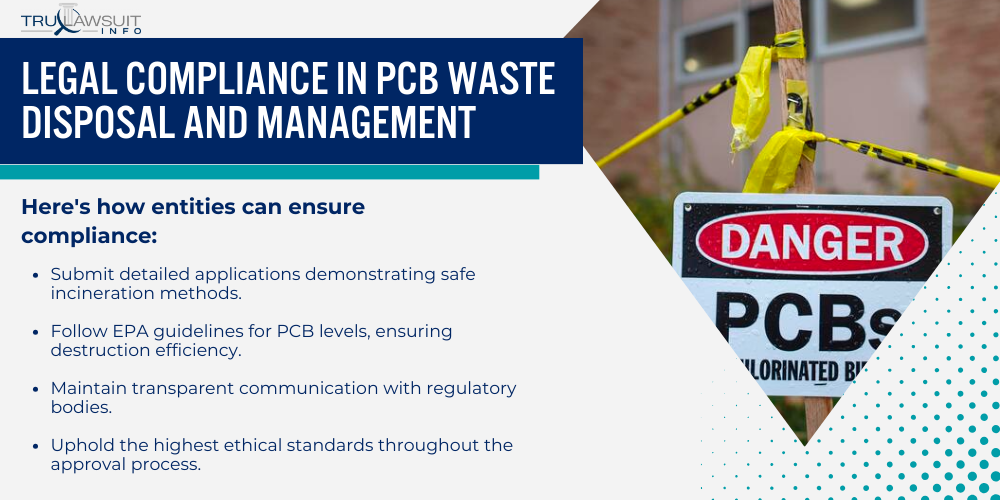
These regulations target the safe handling of PCBs in electrical equipment and hydraulic fluids, designating them as other hazardous substances.
Securing Incineration Approvals through Ethical Legal Practices
Obtaining necessary approvals for PCB waste requiring incineration hinges on following clear legal standards.
Here’s how entities can ensure compliance:
- Submit detailed applications demonstrating safe incineration methods.
- Follow EPA guidelines for PCB levels, ensuring destruction efficiency.
- Maintain transparent communication with regulatory bodies.
- Uphold the highest ethical standards throughout the approval process.
Facilitating Legal and Ethical Alternative Disposal Approvals
Our streamlined process ensures compliance with all legal and ethical guidelines.
We help you navigate the approval process for alternative PCB disposal methods, ensuring your chosen method meets the strictest environmental standards.
Alternative disposal methods for PCBs, such as chemical degradation, require legal sanctions:
- Explore EPA-approved alternative methods for disposal.
- Document all procedures for ensuring the safety of the alternative disposal.
- Garner local and federal approvals by showcasing the effectiveness of non-incineration techniques.
- Emphasize the insignificance of any potential environmental impact.
Chemical Landfill Approvals with Legal Due Diligence
Our rigorous due diligence process ensures compliance with TSCA regulations and minimizes environmental risks.
We help you verify compatibility and conduct comprehensive site assessments to secure landfill approval for PCB disposal.
Legal due diligence is imperative for securing approvals for PCB disposal in chemical landfills:
- Confirm compatibility of PCB waste concentration levels with landfill requirements.
- Conduct thorough site assessments for landfill suitability.
- Obtain all necessary permits and documentation as per TSCA regulations.
- Regularly monitor landfill sites for any leakage or contamination.
Coordinating Facility Approvals with a Focus on Legal Ethics
This process ensures facilities comply with all applicable laws and regulations, while also safeguarding human health and the environment.
Facilities handling Polychlorinated Biphenyls (PCBs), a hazardous material, undergo a rigorous approval process that prioritizes legal and ethical considerations.
Coordinating approvals for facilities handling PCBs incorporates a focus on legal ethics:
- Ensure that facilities meet or exceed all federal standards for handling hazardous substances.
- Regularly audit practices to affirm compliance with health and safety regulations.
- Coordinate with the EPA for facility approval processes and ensure adherence to legal stipulations.
- Foster a culture of legal responsibility and environmental stewardship within the facility.
Risk-Based Approvals in PCB Litigation: A Legal Ethical Framework
Risk-based approvals are critical tools in PCB litigation, balancing legal compliance with ethical imperatives for environmental health and safety.
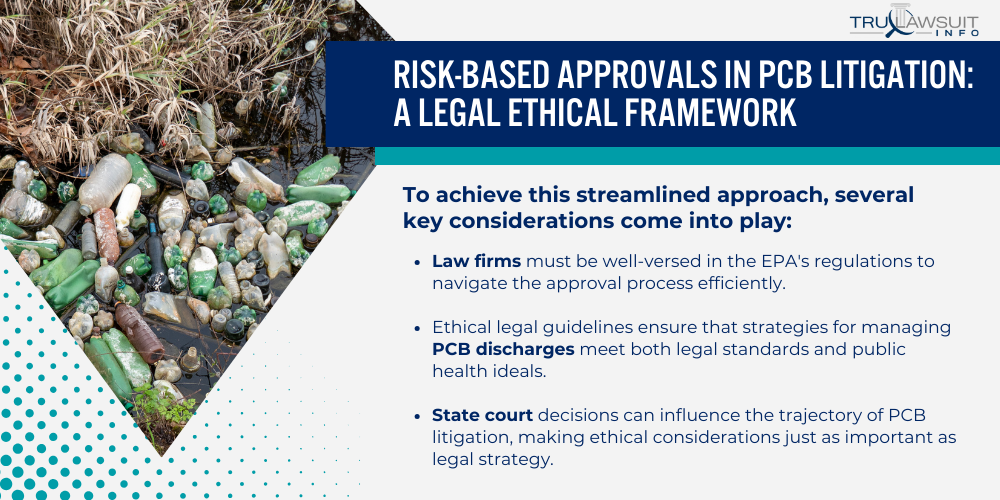
Streamlining the Process with Ethical Legal Guidance
Streamlining PCB litigation involves ethical and legal guidance to expedite the approval process while maintaining adherence to regulations.
This framework’s primary focus is the Environmental Protection Agency (EPA), which has a significant role in the approval and oversight of PCB remediation strategies.
To achieve this streamlined approach, several key considerations come into play:
- Law firms must be well-versed in the EPA’s regulations to navigate the approval process efficiently.
- Ethical legal guidelines ensure that strategies for managing PCB discharges meet both legal standards and public health ideals.
- State court decisions can influence the trajectory of PCB litigation, making ethical considerations just as important as legal strategy.
- Legal counsel plays a part in framing summary judgment petitions in a way that reflects both regulatory compliance and ethical norms.
Guidance documents such as the PCB Facility Approval Streamlining Toolbox (FAST) contribute to ethical streamlining by offering checklists and references, ensuring legal strategies do not overlook public health concerns.
Influencing EPA Decisions with Legal Ethics
Legal ethics can influence decisions beyond mere compliance, shaping the EPA’s approval of risk-based cleanups.
The EPA requires that any cleanup proposal not only meet regulatory criteria but also not present an unreasonable risk of injury to health or the environment.
Here’s how legal ethics come into play:
- Legal representation for entities such as Vermont schools, including the Burlington School District, plays an important role in presenting a case that aligns with ethical standards.
- Mayor Brandon Johnson or other municipal leaders might be involved in litigation, emphasizing ethical actions and social responsibility.
- A successful lawsuit alleging toxic contamination merges rigorous legal argumentation with an ethical framework advocating for remediation.
- It is imperative that attorneys consider the implications of risk-based disposal approvals on environmental protection, especially when advising their clients on legal actions.
Ethical responsibilities are not separate from legal duties but are intertwined to guide the justice system and regulatory bodies such as the EPA in making fair and just decisions for the sake of public health and safety.
Legal professionals often refer to the Nationwide Risk-Based PCB Remediation Waste Disposal Approvals for specific guidance.
Legal and Ethical Responses to Emergency PCB Contamination
When PCB emergencies arise, diverse entities, from schools to transformer facilities, must handle PCB waste management responsibly and adhere to regulations that consider worker safety and environmental protection.
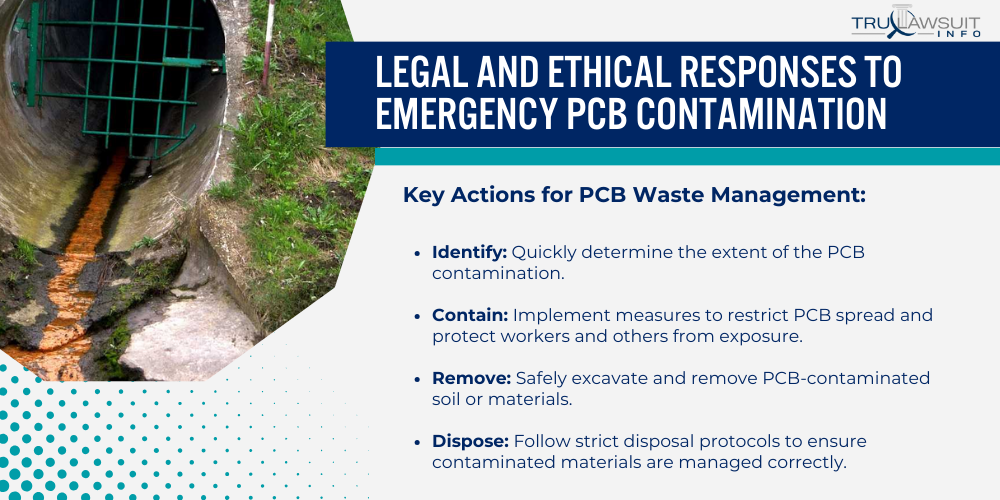
Preparing for PCB Waste Management
Efficient and responsible management of PCB waste is essential during emergency situations to mitigate the risk of exposure.
The Environmental Protection Agency provides specific guidance for emergency response.
Key Actions for PCB Waste Management:
- Identify: Quickly determine the extent of the PCB contamination.
- Contain: Implement measures to restrict PCB spread and protect workers and others from exposure.
- Remove: Safely excavate and remove PCB-contaminated soil or materials.
- Dispose: Follow strict disposal protocols to ensure contaminated materials are managed correctly.
Regulating PCB-Containing Equipment with Ethical Care
Emergency situations may unveil the presence of PCB-containing equipment, such as fluorescent lighting fixtures or electrical transformers.
Regulations dictate the ethical management of these materials.
To ensure responsible handling, a multi-step approach is recommended:
- Inspect: Regularly check equipment in locations such as school buildings for PCB presence.
- Educate: Inform workers and relevant personnel in areas like Washington State of the hazards exposed to pcbs.
- Update: Replace outdated PCB-containing equipment to prevent exposure.
- Monitor: Enforce continuous oversight of locations and equipment to avoid unnoticed PCB exposure.
Upholding Legal and Ethical Standards in PCB Litigation
The integrity of legal proceedings hinges on maintaining unassailable ethical and legal standards, especially in cases involving environmental contamination by harmful substances such as PCBs.
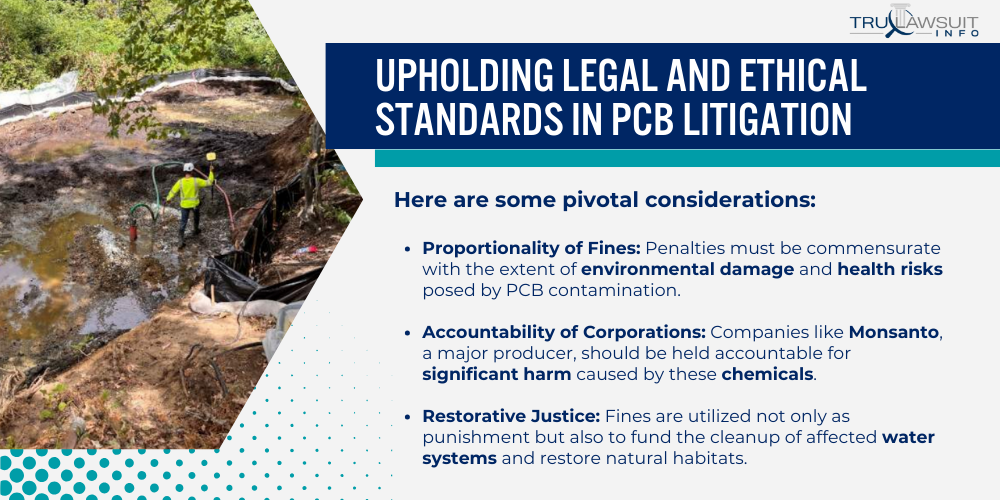
PCB Penalties with an Ethical and Legal Perspective
Penalties in PCB litigation aim to reflect the severity of the infraction while adhering to ethical and legal norms.
Here are some pivotal considerations:
- Proportionality of Fines: Penalties must be commensurate with the extent of environmental damage and health risks posed by PCB contamination.
- Accountability of Corporations: Companies like Monsanto, a major producer, should be held accountable for significant harm caused by these chemicals.
- Restorative Justice: Fines are utilized not only as punishment but also to fund the cleanup of affected water systems and restore natural habitats.
- Deterrence: Establishing firm penalties serves as a deterrent against future negligence in manufacturing and disposing toxic chemicals.
Ensuring Consistent Legal Penalties in PCB Litigation
Consistency in legal penalties enforces the message that all entities must uphold environmental safety standards.
Strategic actions include:
- Legal Precedents: Courts must consider previous cases and outcomes to ensure consistent sentencing and avoid arbitrary penalties.
- Transparent Guidelines: Clear legal frameworks guide Monsanto and other parties on the repercussions of PCB handling violations.
- Scientific Evidence: Robust scientific data substantiates the correlation between Toxic PCBs and significant harm for authoritative legal decisions.
- Coordinated Regulatory Efforts: Collaboration between agencies enhances the effectiveness of regulations and penalties, as seen in the EPA’s involvement in the Spokane River PCB TMDLs.
Role of Legal and Ethical Practices in PCB Cleanup and Litigation
Legal and ethical practices play a vital role in addressing past and current issues arising from the use and disposal of polychlorinated biphenyls (PCBs).
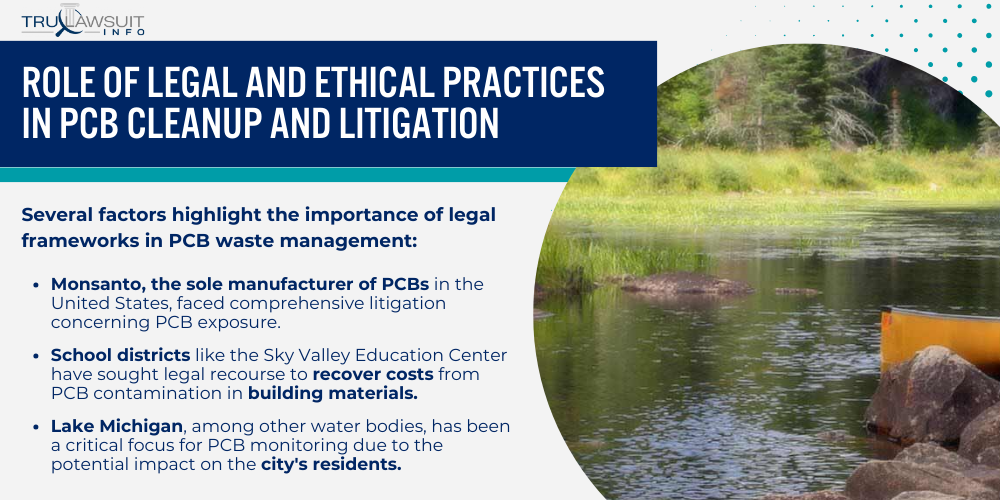
These practices shape the strategies for cleanup efforts, influence litigation outcomes, and promote responsible management of PCB waste.
Monitoring PCB Waste Management within a Legal Framework
Legal frameworks are essential in monitoring PCB waste management to ensure compliance with environmental standards.
The Toxic Substances Control Act mandates strict guidelines for handling and disposing of PCBs due to their toxicity.
Several factors highlight the importance of legal frameworks in PCB waste management:
- Monsanto, the sole manufacturer of PCBs in the United States, faced comprehensive litigation concerning PCB exposure.
- School districts like the Sky Valley Education Center have sought legal recourse to recover costs from PCB contamination in building materials.
- Lake Michigan, among other water bodies, has been a critical focus for PCB monitoring due to the potential impact on the city’s residents and local ecosystems.
- Outside counsel is often retained by entities dealing with PCB litigation to navigate the complexity of federal and state regulations.
Driving Comprehensive PCB Cleanup with Ethical Legal Strategies
Ethical legal strategies are instrumental in ensuring thorough and responsible cleanup of toxic PCBs.
They can guide plaintiffs, such as a city or school district, in holding responsible parties accountable for health problems from PCB exposure.
Here’s how ethical legal strategies can drive comprehensive PCB cleanup:
- Litigation can function as a leverage to accelerate the comprehensive cleanup of affected sites.
- School districts and other entities utilize legal action to push for the remediation of PCBs to protect their constituents.
- The intricacies of PCB litigation often require sophisticated legal strategy, ensuring a focus on comprehensive and effective cleanup efforts.
- Lawsuits aim to hold co-defendants responsible not just for cleanup but also for the release of toxic PCBs into the environment.
Promoting Greener Cleanup Practices through Ethical Legal Advocacy
Through ethical legal advocacy, attorneys can champion greener cleanup practices for reducing the environmental impact of PCB remediation.
Here are the greener cleanup best management practices that ethical legal advocacy can promote:
- Successful litigation can lead to the adoption of Greener Cleanup Best Management Practices, enhancing the sustainability of remediation projects.
- Advocacy often includes pressing for the cleanup of PCBs in a manner that reduces the impact on the city’s air and protects water bodies from further contamination.
- Case studies, such as those included in the EPA’s Greener Cleanups fact sheet, provide critical insights on effective methods for sustainable PCB waste management.
- Encouraging entities charged with PCB cleanup to adopt best practices serves both legal and environmental interests, benefiting current and future generations.
Frequently Asked Questions
-
Polychlorinated biphenyls (PCBs) have been linked to various health issues that have prompted lawsuits.
Exposure to PCBs are associated with an increased risk of cancer, particularly liver and skin cancers.
Additionally, PCBs can cause a range of other health problems, such as immune system impairments, reproductive issues, and developmental neurotoxic effects in children.
-
Court rulings on PCB exposure claims have varied, taking into account the circumstances of exposure and applicable laws.
Courts have assessed liability based on factors such as the duration of exposure, concentration levels of PCBs, and the defendant’s adherence to safety regulations.
-
Yes, individuals who have been similarly harmed by PCB exposure can typically join a class action lawsuit against manufacturers.
This collective form of legal action allows for the pooling of resources and can provide a pathway to compensation for damages experienced by a large group of people.
-
For a successful legal claim related to PCBs, plaintiffs generally need to demonstrate causation and provide evidence of harm.
The legal standard requires proof that PCB exposure directly caused the health issues experienced.
This often includes medical diagnoses, expert testimonies, and evidence of PCB presence in the environment or within the body.
-
In addressing environmental damage from PCBs, the legal process involves demonstrating the impact of contamination on ecosystems.
This includes assessing the extent of pollution, its effect on wildlife and habitat quality, and associated cleanup costs to determine appropriate compensation.
-
Major PCB litigations like those against Monsanto and Bayer have set precedents in holding corporations accountable for PCB contamination.
They establish the principle that manufacturers are responsible for their products’ environmental and health consequences.
Additionally, these cases often result in significant financial settlements and influence regulations governing the monitoring and remediation of PCBs.

Attorney Jessie Paluch, founder of TruLawsuit Info, has over 25 years of experience as a personal injury and mass tort attorney, and previously worked as an international tax attorney at Deloitte. Jessie collaborates with attorneys nationwide — enabling her to share reliable, up-to-date legal information with our readers.
Legally Reviewed
This article has been written and reviewed for legal accuracy and clarity by the team of writers and legal experts at TruLawsuit Info and is as accurate as possible. This content should not be taken as legal advice from an attorney. If you would like to learn more about our owner and experienced injury lawyer, Jessie Paluch, you can do so here.
Fact-Checked
TruLawsuit Info does everything possible to make sure the information in this article is up to date and accurate. If you need specific legal advice about your case, contact our team by using the chat on the bottom of this page. This article should not be taken as advice from an attorney.
You can learn more about the PCB Exposure Lawsuit by visiting any of our pages listed below:
Here, at Tru Lawsuit Info, we’re committed to helping victims get the justice they deserve.
To do this, we actively work to connect them with attorneys who are experts in litigating cases similar to theirs.
Table of Contents
Tru Lawsuit Info is a reliable source of information about issues that may affect your health and safety, such as faulty products, data breaches, and environmental hazards.
Our team of experienced writers collaborates with medical professionals, lawyers, and advocates to produce informative articles, guides, and other resources that raise awareness of these topics.
Our thorough research provides consumers with access to reliable information and updates on lawsuits happening around the country. We also can connect consumers with attorneys if they need assistance.
Here, at Tru Lawsuit Info, we’re committed to helping victims get the justice they deserve.
To do this, we actively work to connect them with attorneys who are experts in litigating cases similar to theirs.
